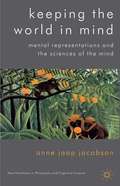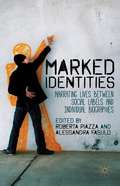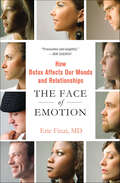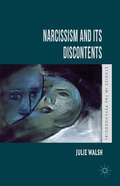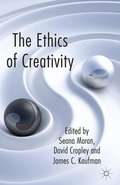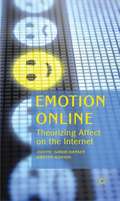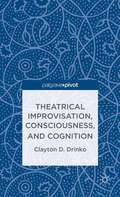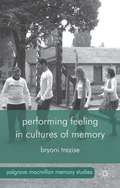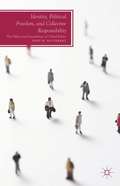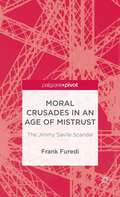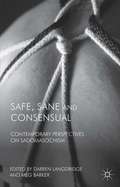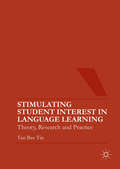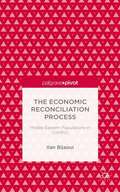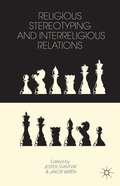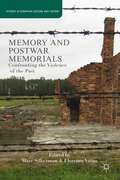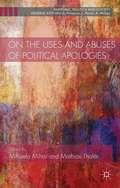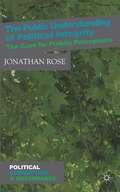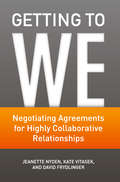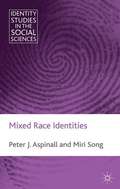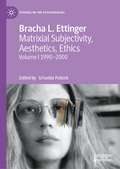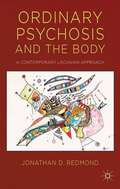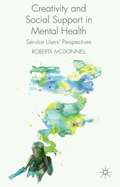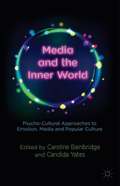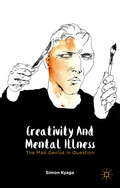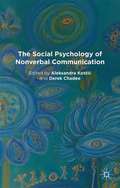- Table View
- List View
Keeping the World in Mind
by Anne Jaap JacobsonThere have been two major models of the mind's relation to its environment in Western though, both of which employ the term 'representation', but in quite different ways. The newer one, dominant today in philosophy, takes the mind to have states about its environment. The older concept, originating with Aristotle but still present in every day speech and in the new sciences of the mind, takes the mind to sample its environment. This book clarifies the old notion, solves some serious problems it faces, and explores the implications for philosophy of an awareness of the view of the mind emerging from cognitive neuroscience. Topics covered include concepts, perception, emotions, beliefs and actions.
Marked Identities
by Roberta Piazza Alessandra FasuloWestern society has become increasingly diverse, but stereotypes still persist in the public discourse. This volume explores how people who have a marked status in society - among them Travellers, teenage mothers, homeless people - manage their identity in response to these stereotypes.
The Face of Emotion: How Botox Affects Our Moods and Relationships
by Eric FinziWilliam Shakespeare famously wrote that "a face is like a book," and common wisdom has it that our faces reveal our deep-seated emotions. But what if the reverse were also true? What if our facial expressions set our moods instead of revealing them? What if there were actual science to support the exhortation, "smile, be happy?" Dermatologic surgeon Eric Finzi has been studying that question for nearly two decades, and in this ground breaking book he marshals evidence suggesting that our facial expressions are not secondary to, but rather a central driving force of, our emotions. Based on clinical experience and original research, Dr. Finzi shows how changing a person's face not only affects their relationships with others but also with themselves. In his studies using Botox, he has shown how inhibiting the frown of clinically depressed patients leads many to experience relief. This work is a dramatic departure from the neuroscience-based thinking on emotions that tends to view emotions solely as the result of neurotransmitters in the brain. Part absorbing medical narrative, part think piece on the nature of emotion, this is a bold call for us to rethink the causes of unhappiness.
Narcissism and Its Discontents
by Julie WalshNarcissism and Its Discontents challenges the received wisdom that narcissism is only destructive of good social relations. By building on insights from psychoanalysis and critical theory it puts forward a theorisation of narcissistic sociability which redeems Narcissus from his position as the subject of negative critique.
The Ethics of Creativity
by James C. Kaufman Seana Moran David CropleyThe Ethics of Creativity illuminates the thorny issues that arise when novel creative ideas collide with what we believe to be 'right' or 'good'. This book tackles questions of when creativity and ethics tend to coincide and when conflict, and how both might be harnessed to support a brighter future for all.
Emotion Online
by Joanne Garde-HansenEmotion Online: Theorizing Affect on the Internet takes stock of where we are emotionally with regards to the Internet in social and cultural terms. Online users are switching between personal, national, international and global modes of being and feeling that shape private and public experiences. Drawing upon the well-established discipline of media studies, the book travels theoretically through, across, in and between examples of traditional media as they merge and emerge online. Garde-Hansen and Gorton explore how we feel about, and how we feel in, our online media ecology in the context of global media platforms.
Theatrical Improvisation, Consciousness, and Cognition
by Clayton D. DrinkoImprovisation teachers have long known that the human mind could be trained to be effortlessly spontaneous and intuitive. Drinko explores what these improvisation teachers knew about improvisation's effects on consciousness and cognition and compares these theories to current findings in cognitive neuroscience, psychology, and philosophy.
Performing Feeling in Cultures of Memory
by Bryoni TrezisePerforming Feeling in Cultures of Memory brings memory studies into conversation with a focus on feelings as cultural actors. It charts a series of memory sites that range from canonical museums and memorials, to practices enabled by the virtual terrain of Second Life, popular 'trauma TV' programs and radical theatre practice.
Identity, Political Freedom, and Collective Responsibility
by Eddy M. SouffrantEddy M. Souffrant calls for a reassessment of the starting points of moral, social, and political philosophy that takes into account the actual living circumstances of persons living the 21st century.
Moral Crusades in an Age of Mistrust: The Jimmy Savile Scandal
by Frank FurediThe epidemic of scandals unleashed by the Savile Scandal highlights the precarious status of relations of trust. The rapid escalation of this crisis offers insights into the relationship between anxieties about childhood and the wider moral order. This book explains why western society has become so uncomfortable with the exercise of authority.
Safe, Sane and Consensual: Contemporary Perspectives on Sadomasochism
by Meg John Barker Darren LangdridgePsychological and medical perspectives on sadomasochism (SM) have historically been concerned with understanding it as a form of psychopathology. In the past (but still often today) studies of SM have been concerned with extreme and most often non-consensual acts. More recently, however, there has been growing interest in exploring the meaning of sadomasochism in non-pathological ways. This book includes work from across the social sciences exploring a variety of aspects of SM from a non-pathological perspective. There are discussions of the history and culture of SM, medical and legal understandings, along with theory and original research on the topic. There are also sections on SM and psychotherapy and writing on bridging the academic/activist divide. This book, now in paperback with a new introduction, includes contributions from an international group of academics, practitioners and activists and represents some of the most recent cutting edge work in the field by leading scholars.
Stimulating Student Interest in Language Learning
by Tan Bee TinThis book explores the issues and concerns many language teachers have in not just helping able students to learn a foreign or second language but more importantly how to get reluctant learners to become interested in language learning. Tin proposes 'interest' as an important construct that requires investigation if we are to understand second language learning experiences in a modern globalised world. The book offers both theoretical explorations and empirical findings arising from the author's own research in the field. Chapters demonstrate how various theoretical and empirical findings can be applied to practice so as to raise the awareness of the importance of interest in language learning and teaching. For teacher trainers and educators, researchers, and practising language teachers, this comprehensive study provides tools to stimulate student interest in language learning for successful language learning.
The Economic Reconciliation Process: Middle Eastern Populations in Conflict
by Ilan BijaouiThe Economic Reconciliation Process develops hybrid cross-border models based on the free economic zone, the industrial district, and the cluster to generate a common economic interest between countries and populations in declared or potential conflict in the Middle East.
Religious Stereotyping and Interreligious Relations
by Jesper Svartvik Jakob WirénReligion can heal, but it can hurt as well. This collection of essays addresses some key issues of religious stereotyping, prejudice, and discrimination, and considers a wide range of important topics which haunt our societies today. When stereotyping becomes the oxygen we inhale, when it is so important to us that we cannot see how we can survive without it - what can and should we do? Twenty-two scholars from Australia, Europe, the Middle East and North America explore the anatomy of various forms of stereotyping and ways to oppose them.
Memory And Postwar Memorials
by Marc Silberman Florence VatanThe twentieth century witnessed genocides, ethnic cleansing, forced population expulsions, shifting borders, and other disruptions on an unprecedented scale. This book examines the work of memory and the ethics of healing in post authoritarian societies that have experienced state-perpetrated violence.
On the Uses and Abuses of Political Apologies
by Mihaela Mihai Mathias ThalerRecent decades have witnessed a sharp rise in the number of state apologies for historical and more recent injustices, ranging from enslavement to displacement and from violations of treaties to war crimes, all providing the backdrop to displays of official regret. Featuring a host of leading authors in the field, this book seeks to contribute to the growing literature on official apologies by effectively combining philosophical reflection and empirical analysis. It achieves two interrelated goals: it enriches the theoretical debates on the nature and functions of apologies while bringing forth new insights from hitherto unexamined normative horizons. It further addresses often overlooked aspects of political apologies, such as their non-verbal dimension as well as religious overtones, while testing theoretical reflections through encounters with real practices of state apologies. Finally, the book explores the obstacles to, and the limitations of, political apologies. The result is an excellent interdisciplinary volume that affords the reader a better understanding of conditions for a legitimate and successful state apology.
The Public Understanding of Political Integrity
by Jonathan RoseThrough detailed analyses of major and newly available datasets, this study examines the utility of a public probity-focused approach to understanding citizen disaffection with politicians. It shows that perceptions of public probity are coherent, substantively meaningful, responsive, and, most importantly, that they do matter.
Getting To We
by Kate Vitasek Jeanette Nyden David FrydlingerDrawing on best practices and real examples from companies who are achieving record results, Getting to We flips conventional negotiation on its head, shifting the perspective from a tug of war between parties to a collaborative partnership where both sides effectively pull against a business problem.
Mixed Race Identities
by Miri Song Peter J. AspinallThis book explores the ethnic and racial options exercised by young mixed race people in Britain. It reveals the diverse ways in which young people identify and experience their mixed status, the complex nature of such identities, and the rise of other identity strands which are now challenging race and ethnicity as dominant and salient identities.
Matrixial Subjectivity, Aesthetics, Ethics: Volume 1 1990–2000 (Studies in the Psychosocial)
by Bracha L. EttingerThis book is the first of two volumes that, together, present for the first time a comprehensive collection of three decades of the theoretical writings of artist and theorist Bracha L Ettinger. Edited and introduced by Griselda Pollock they provide a systematic anthology of Ettinger’s path-breaking and influential concept of Matrixial subjectivity-as-encounter and jointness-in-difference, and chart her radical intervention in aesthetics, ethics and theories of subjectivity far beyond classical feminist and current gender/queer theory.This first volume includes the writings in which Ettinger elaborates her original concepts of Matrixial space-time and metramorphosis, fascinance, wit(h)nessing, resonance, transcryptum, com-passion, self-fragilization and resistance, co-emergence and copoiesis transform theories of the subject, Eros, alliance and love, sexual difference, alterity, relationality, trauma and violence. Her critical dialogue with theorists including Levinas, Lacan, Lyotard and Deleuze & Guattari, Butler, Cavarero and Irigaray is evident here.A leading authority on Matrixial theory, Griselda Pollock provides explanatory prefaces to each chapter and a lengthy introduction that situates Ettinger’s work in relation to socio-psychoanalytical theory and practice and current social and philosophical debates. Ettinger’s interlacing of psychoanalysis, ethics, and aesthetics can be seen here to address some of the deepest challenges of our social, cultural and political existence today.
Ordinary Psychosis and The Body
by Jonathan D. RedmondCurrent Lacanian ideas on psychosis have much to contribute to the complex and often surprising forms of psychotic symptomatology encountered in clinical practice. By focussing on the unique experience of individuals with psychosis, this book examines the centrality of body phenomena to both the onset and stabilisation of psychosis.
Creativity and Social Support in Mental Health
by Roberta McdonnellThis book weaves together service users' lived experiences of mental health recovery and ideas about how creative activities such as art, music, and creative reading and writing can promote it, particularly within social and community settings.
Media and the Inner World: Psycho-cultural Approaches to Emotion, Media and Popular Culture
by Caroline Bainbridge Candida YatesThis book applies insights from the spheres of academic scholarship and clinical experience to demonstrate the usefulness of psychoanalysis for developing nuanced and innovative approaches to media and cultural analysis.
Creativity and Mental Illness: The Mad Genius in Question
by S. KyagaIs there really a thin line between madness and genius? This book provides a thorough review of the current state of knowledge on this age old idea, and presents new empirical research to put an end to this debate, but also to open up discussion about the implications of its findings.
The Social Psychology of Nonverbal Communication
by Derek Chadee Aleksandra KostićThe Social Psychology of Nonverbal Communication gathers together leading nonverbal communication scholars from around the world to offer insight into a range of issues within the nonverbal literature with the aim to rethink current approaches to the subject.
